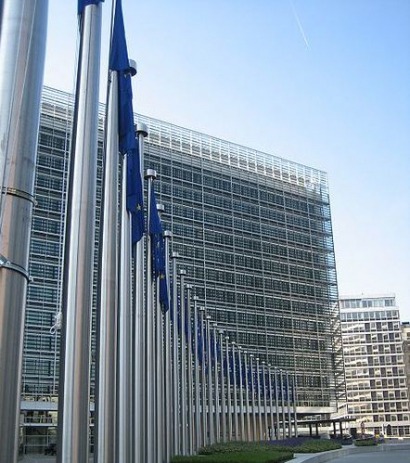Gratifyingly, a number of the projects on what the EU calls a "non-exhaustive" list of good projects it has supported fall under the banner of renewable energy and sustainability.
These include:
- A research team developing bio-fuel made of algae to reduce greenhouse gas emissions – Funding: €1.43 million.
- An Italian-led research group finding ways to make historic buildings more energy efficient, helping protect our cultural heritage and climate – Funding: €4.99 million.
- Partners from EU-funded project ADDRESS who have developed a unique Energy Box which will allow consumers to programme energy usage during non-peak periods, saving money – Funding: €8.99 million.
- The potential of next generation biofuels being looked at in EU-funded research project BABETHANOL by engineers from Latin America & Europe – Funding: €3.16 million.
- EU supporting demonstration of zero emission buses using hydrogen fuel cell technology in circulation in several European cities – Funding €25.87 million.
- European researchers demonstrating that 70% percent of today’s polymers can be derived from biomass, massively reducing our dependence on petroleum-based plastic production – Funding: €13.9 million.
- An EU project developing small solar power systems which will allow homes and workplaces to generate their own electricity and meet their heating and cooling requirements – Funding: €3.27 million.
- Engineers in EU MARINA PLATFORM project who have exploited the possibility to combine wind with waves, tides and currents in order to maximize the output of an offshore platform and to reduce costs – Funding: €8.7 million.
- European researchers who have developed a new approach for building cars which shaves 40 percent off their weight, meaning less fuel consumption and less CO2 emissions – Funding: €10.4 million.
- Developing smart energy technology in Amsterdam for growth and fighting climate change – "Amsterdam, Smart City" – Funding: €1.56 million. The ‘Amsterdam, Smart City’ project’s aim is to test new technologies that save energy and then make them available to people and businesses in the Amsterdam region. ‘Amsterdam, Smart City’ acted as a catalyst for new innovations in the field of smart energy technologies. Within the project over 50 private firms (multinationals and SMEs) worked together with TNO (Dutch Knowledge Institute, a public independent research institute), Housing Cooperations and the Municipality.
- Andalusian city leading the way to energy-saving lighting systems – Funding: approx €1.32 million. In 2007, Light Environment Control S.L. (LEC) in the town of Barbate, Andalusia, became the first company in Europe to light an entire city with LED technology. LEC became a benchmark in the led sector and a national leader at national level, giving effective and tailor-made solutions to its clients. LEC is located in one the most depressed areas of Spain with 40% of unemployment in 2012. Since LEC installed its new production centre for the design, research and manufacture of led-lighting systems, it has created 100 direct jobs and around 150 indirect jobs. It has also permitted to keep high skilled professionals from the region.
- ERDF improving energy efficiency in buildings and promote job creation in France – Funding: €320 million. The French government has been encouraged through the ERDF to improve energy efficiency in buildings and promote job creation. It is meeting this challenge head-on with its plans to tackle 800 000 social housing units in 15 areas between 2009 and 2020.To date, the results have been impressive. By the end of the first phase in March 2011, 63 000 homes were retrofitted and of those, over a third will be of Class A energy efficiency rating. This totals energy savings equal to €1,170 per household. One of the focus regions for this project is Brittany where 153 000 social housing units, managed by 38 operators, are awaiting conversion. In the first nine months of the project 2 103 households were brought up from the lowest standard to A and B efficiency levels. In this same period it is estimated that 760 jobs were created locally in the construction and planning areas.
- The "Baltic biomass network" project in Tukums, Latvia, and regional bioenergy development strategy – Funding: €1.6 million (ERDF). Between 2008 and 2009 the Tukums local authority joined the "Baltic Biomass Network" project and together with various stakeholders developed a regional bioenergy development strategy. The municipally-owned heating company "Tukuma Siltums" has installed two new biomass boilers of 10 MW capacity to replace heavy, old fuel oil boilers. In addition, flue gas condensers were installed using technology developed by a local company. Each of the boilers provides additional efficiency in terms of heat energy production, substantially increasing the efficiency of heat energy production and replacing fossil fuels with renewables. The project accounts for additional savings of about 15-25 percent of energy production, prevention of further increase in heating costs for the inhabitants, more than 90% decrease in particulate matter emissions and considerable decrease in emissions of sulphur, ash and other substances.
- Building a Bio-Gas Station in Dešov – Funding: € 1,056,000 (EAFRD). EU agricultural funds supported the development of a biogas station which converts 10 000 tonnes of bio inputs (mainly from pig manure, maize and livestock slurry) into around 4 300 MWh of electricity each year and provides a long-term economic diversification option for the farm business. The project also helps provide new income sources for farmers supplying the bio inputs that are converted into gas. Bio-molecular processes that occur during the gas extraction procedure convert the bio-products into biogas plus a good quality compost material.
For additional information:
European Union


